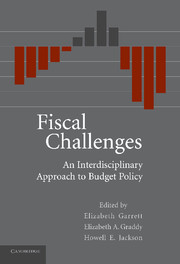Book contents
- Frontmatter
- Contents
- Preface
- Contributors
- PART ONE THE LAW AND POLITICS OF FISCAL POLICY
- PART TWO UNDERSTANDING FEDERAL DEFICITS AND PUBLIC DEBT
- PART THREE BUDGETING AND FISCAL CONSTRAINTS AT THE STATE LEVEL
- PART FOUR INTERGOVERNMENTAL ASPECTS OF BUDGET POLICY
- PART FIVE JUDICIAL POWERS AND BUDGET POLICY
- 13 New Property, Entrenchment, and the Fiscal Constitution
- 14 Courts, Constitutions, and Public Finance: Some Recent Experiences from the States
- Part Five Bibliography
- Index
14 - Courts, Constitutions, and Public Finance: Some Recent Experiences from the States
Published online by Cambridge University Press: 23 December 2009
- Frontmatter
- Contents
- Preface
- Contributors
- PART ONE THE LAW AND POLITICS OF FISCAL POLICY
- PART TWO UNDERSTANDING FEDERAL DEFICITS AND PUBLIC DEBT
- PART THREE BUDGETING AND FISCAL CONSTRAINTS AT THE STATE LEVEL
- PART FOUR INTERGOVERNMENTAL ASPECTS OF BUDGET POLICY
- PART FIVE JUDICIAL POWERS AND BUDGET POLICY
- 13 New Property, Entrenchment, and the Fiscal Constitution
- 14 Courts, Constitutions, and Public Finance: Some Recent Experiences from the States
- Part Five Bibliography
- Index
Summary
INTRODUCTION
Unlike the federal Constitution, virtually all state constitutions give detailed attention to questions of public finance. State constitutions limit spending, mandate certain types of spending, constrain taxation and debt, and require special procedures for enacting a budget. One consequence of the constitutionalization of the state fisc is its judicialization, as these measures trigger litigation. Fiscal and political conflicts turn into legal disputes, with courts joining governors and legislatures in shaping state budgets and making state fiscal policy.
This chapter provides an early-21st-century snapshot of the state constitutional law of state finance through a survey of six recent state supreme court decisions – all handed down since the turn of the millennium – interpreting key provisions of their states' fiscal constitutions. Part II examines three cases concerning provisions intended to constrain the state fisc: a legislative supermajority vote for tax increases, a voter-approval requirement for new debt, and a balanced-budget requirement. In two cases, courts delivered decisions that aided the more political branches of government, but were sharply at variance with the constitutional text. In the third, the court followed the constitutional text and, in so doing, challenged a state's fiscal arrangements. Part III focuses on three cases dealing with the budgetary process: the executive budget, limits on the content of appropriations bills, and the item veto. These involved governor–legislature conflicts, debates over the programmatic reach of the special budgetary procedures, and questions about the scope of judicial intervention in these political–fiscal–constitutional matters.
- Type
- Chapter
- Information
- Fiscal ChallengesAn Interdisciplinary Approach to Budget Policy, pp. 418 - 445Publisher: Cambridge University PressPrint publication year: 2008
- 3
- Cited by



